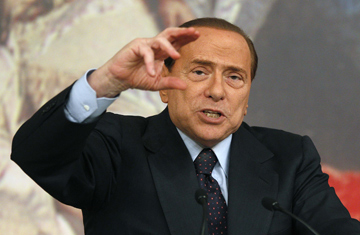
Italian Prime Minister Silvio Berlusconi, at a press conference in Rome on Feb. 9, 2011
The war between Italian Prime Minister Silvio Berlusconi and his country's judiciary was raised a notch on Wednesday when prosecutors asked for the immediate start of a trial that would see the Premier accused of paying for sex with an underage prostitute and abusing his power to cover it up.
"These trials are a farce," said Berlusconi at a press conference in Rome. "The accusations are unfounded." He added that he would attempt to sue the state, and declared that the taxpayer would be the ultimate victim because "the prosecutors can't be held accountable, and that's something that needs to be changed and that [our government] will change."
Berlusconi's calls for reform — if not the reasons behind them — are likely to resonate with his countrymen. Nightmarish bureaucracy, a three-tiered appeals system and a payment structure that incentivizes lawyers to drag out proceedings all mean it's not uncommon for a case to take a decade to reach a final judgment. According the World Bank, it takes on average 1,210 days — more than three years — to resolve a commercial dispute in Italy, compared with 331 days in France and 394 in Germany.
"The economic impact is devastating," says Marcella Panucci, director of legislative affairs at Confindustria, Italy's employers' federation. Debtors will often take to the courts just to delay payments. Legal fees are likely to run to nearly a third of the value of a claim. And drawn-out court cases all too often leave entrepreneurs in a state of uncertainty. "Companies need to know what the results of a decision will be in a reasonable time, so they can plan their costs, their strategy," says Panucci.
It's against this backdrop that Berlusconi's government has introduced its latest reform to the judiciary: a measure that would limit trials to two years. Could this be the change Italians are waiting for?
Most likely, no. According to opposition politicians and analysts, the focus of the proposal has less to do with streamlining justice for ordinary Italians than with helping the Prime Minister beat back charges from what he describes as politicized prosecutors bent on bringing him down.
Berlusconi likes to say he's been fighting the justice system since he entered politics. By his own count, the charismatic billionaire has faced charges 28 times in the 17 years since he first ran for office in 1994. And though he has been convicted several times by the lower courts — for corruption, perjury and false accounting — he has always managed to slip the net during the appeals process. Berlusconi has beaten many of the charges in court, but he's also had several dropped after Parliament passed laws that his critics say were designed to get him off the hook.
But now Berlusconi is facing the most serious allegations yet, with a potential prison sentence of up to 15 years. In response to the prosecutors' request to start the trial right away, the Premier and his allies have become increasingly vocal about the need to rein in the judiciary. "There are parts of the judicial system that take aim at this or that politician," says Gaetano Pecorella, a parliamentarian with Berlusconi's People of Liberty Party. "It's a great weight on Italian politics."
By a quirk of the law, Berlusconi finds himself at odds with most Italians on the length of trials. Italy's statute of limitations doesn't stop when charges are filed, but continue to tick through the initial trial and its appeals, meaning that if defendants can stretch out proceedings for long enough, they can simply run out the clock — something Berlusconi has done several times. "The longer the trial, the more often the statute of limitations takes care of the problem for him," says Roberto D'Alimonte, a professor of political science at Rome's LUISS University. "There is really a conflict there between the priority of the Italian people and his own priorities."
Italy's justice system needs more than just piecemeal measures, say analysts from both the magistrate groups and Confindustria. In the absence of broader reforms, the measures being discussed this week will have much the same effect as the statute of limitations. Instead of speeding up trials, the two-year limit will cut many of them short — including a few of Berlusconi's — before they reach a conclusion.
If Italy is going to deliver timely justice for all its citizens, Italy's scattered small courts need to be consolidated into regional branches, large enough to allow judges to specialize, says a report from Confindustria. The bureaucracy needs to be streamlined, with professional administrators replacing career judges in the management of the tribunals. Alternatives, such as mediation, need to be incentivized, and lawyer fees need to be restructured to speed up trial times. "A [much more] comprehensive reform process is needed, touching on both organizational and procedural aspects," says Confindustria's Pannuci.
Yet sadly, when it comes to the justice system, there's one more thing that most Italians can agree on. As long as the Italian government is engaged in battle with the judiciary, serious changes don't have much of a chance. "We fight wars," says MP Pecorella. "But in these three years, there's little that's been built." As long as Berlusconi's personal troubles remain the focus of his government's efforts, the people will have to wait.
